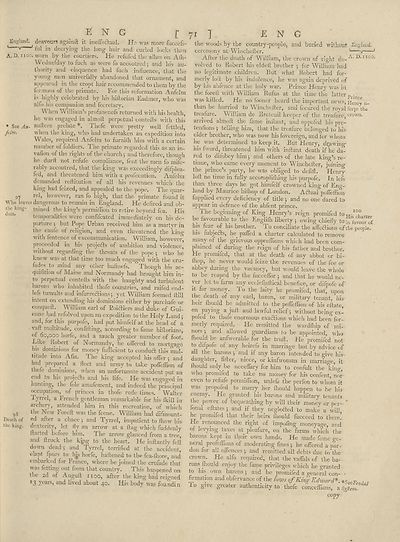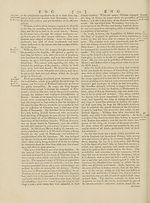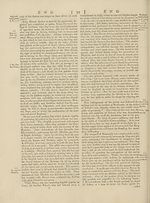Encyclopaedia Britannica, or, a Dictionary of arts, sciences, and miscellaneous literature : enlarged and improved. Illustrated with nearly six hundred engravings > Volume 8, ELE-FOR
(83) Page 71
Download files
Complete book:
Individual page:
Thumbnail gallery: Grid view | List view

E' N G
C
* See An-
/elm.
England, deavours againil it ineffe&ual. Ha was more Taccefs-
' ^ ful in decrying the long hair and curled locks then
A.D. uoo. worn by the courtiers. He refufed the allies on Aih-
Wednefday to fueh as were fo accoutred; and his au¬
thority and eloquence had fuch influence, that the
young men univerfally abandoned that ornament, and
appeared in the cropt hair recommended to them by the
fermons of the primate. For this reformation Anfelm
is highly celebrated by his hiftorian Eadmer, who was
aifo his companion and fecretary.
W hen William’s profanenefs returned with his health,
he Avas engaged in alraoft perpetual conteils Avith this
auftere prelate *. Thefe were pretty Avell fettled,
Avhen the king, who had undertaken an expedition into
Wales, required Anfelm to furnilh him Avith a certain
number of foldiers. The primate regarded this as an in-
vafion of the rights of the church 5 and therefore, though
he durft not refufe compliance, fent the men fo mife-
rably accoutred, that the king Avas exceedingly difplea-
fed, and threatened him with a profecution. Anfelm
demanded reftitution of all his revenues Avhich the
king had feized, and appealed to the pope. The quar-
97 r(d> however, ran fo high, that the primate found it
Who leaves dangerous to remain in England. He defired and ob-
doin^115" tained t,ie. king’s permiflion to retire beyond fea. His
temporalities Arc re confifcated immediately on his de¬
parture but Pope Urban received him as a martyr in
the caufe of religion, and even threatened the king
Avith fentence of excommunication. William, hoAveveiq
proceeded in his projects of ambition and violence,
without regarding.the threats of the pope; Avho he
kneAV Avas at that time too much engaged Avith the cru-
fades to mind any other buflnels. Though his ac-
quilition of iVIaine and Normandy had brought him in-
to perpetual contefts Avith the haughty and turbulent
barons Avho inhabited thofe countries, and raifed end-
lefs tumults and infurre&ions; yet William feemed ft ill
intent on extending his dominions either by purchafe or
conqueft. William earl of Boicliers and duke of Gui-
enne had refolved upon an expedition to the Holy Land;
and, for this purpofe, had put himfelf at the head of a.
vaft multitude, confilting, according to fome hiftorians,
of 60,000 horfe, and a much greater number of foot.
Like Robert of Normandy, he offered to mortgage
his dominions for money fufficient to conduct this mul¬
titude into Afia. The king accepted his offer ; and
had prepared a fleet and army to take poffeflion of
thefe dominions, Allien an unfortunate accident put an
mid to his projects and his life. He Avas engaged in
hunting, the foie amufement, and indeed the principal
occupation, of princes in thofe rude times. Walter
Tyrrel, a French gentleman remarkable for his Ikiil in
archery, attended him in this recreation, of which
the Ncav Foreft Avas the feene. William had difmount-
ed after a chace ; and Tyrrel, impatient to flio w his
dexterity, let flv an arroAv at a ftag Avhich fuddenly
ftarted before him. The arroAv glanced from a tree,
and ftruck the kyig to the heart. He inftantly fell
down dead; and Tyrrel, terrified at the accident,
clapt fpurs to h^s horfe, haftened to the fea-ftiore, and
embarked for France, Avhcre he joined the crufade that
was fetting out from that country. This happened on
the 2d of Auguft 1100, after the king had reigned
13 years, and lived about 40. His body Avas foundin
71
93
Death of
the king.
1 ENG
the Avoods by the country-people, and buried without England,
ceremony at Winchefter. 1—--v~—’
After the death of William, the croAvn of right dc- A‘ D-IIC3-
voiced to Robert his eldeft brother ; for William had
no legitimate children. Biit Avhat Robert had for¬
merly loir by his indolence, he Avas again deprived of
by Ins abfence at the holy Avar. Prince Henry was in
the foreft Avith William Rufus at the time the latter p, ; ^
was killed. . He no fooner heard the important neAvs, Henry u-
than he hurried to Winchefter, and fecured the royal furps the
treafure. William de Breteuil keeper of the treafure, crown,
arrived almoft the fame inftant, and oppofed his pre-
tenfions ; telling him, that the treafure belonged to his
elder brother, Avho AA'as now his fovereign, and lor w hom
he Avas determined to keep it. But Henry, draAving
his fword, threatened him with inftant death if he da¬
red to difobey him; and others of the late king’s re¬
tinue, who came every moment to Winchefter, joining
the prince’s party, he was obliged to defift. Henry
loft no time in fully accomplifhing his purpofe. In lefs
than three days he got himfelf croAvned king of Eng¬
land by Maurice bilhop of London. Aclual poffeflion
fupplied every deficiency of title, and no one dared to
appear in defence of the abfent prince.
The beginning of King Henry’s reign promifed to „• IC}°
be favourable to the Englilh liberty ; owing chiefly to “‘favour 0£
his fear of his brother. To conciliate the affbaions of the people,
his fubjeds, he paffed a charter calculated to rennwe
many of the grievous oppreflions which had been com¬
plained of during the reign of his father and brother.
He promifed, that at the death of any abbot or bi¬
lhop, he never would feize the revenues of the fee or
abbey during the vacancy, but would leave the Avhole
to be reaped by the fucceffor ; and that he Avould ne¬
ver let to farm any eccleftaftical benefice, or difpofe of
it for money. To the laity he promifed, that, upon
the death of any earl, baron, or military tenant, his
neir ffiould be admitted to the poffeflion of his eftate,
on paying a juft and lawful relief; without being ex-
pofed to thofe enormous exactions Avhich had been for¬
merly required. He remitted the wardfliip of mi¬
nors ; and alloAved guardians to be appointed, Avho
ffiould t>e anhverable for the truft. Fie promifed not
to difpofe of any heirefs in marriage but by advice of
all the barons ; and if any baron intended to give his-
daughter, lifter, niece, or kinfwoman in marriao-e, it
Ihould only be neceffary for him to confult the king,
who promifed to take no money for his confent, nor
even to refufe permiflion, unleft the perfon to whom it
Aims propofed to marry her Ihould happen to be his
enemy. Fie granted his barons and military tenants
the power, of bequeathing by will their money or per- '
fonal eftates ; and if they negle&ed to make a Avill
he promifed that their heirs Ihould fucceed to them!
Fie renounced the right of impoling moneyage, and
of levying taxes at pleafure, on the farms Avlnch the
barons kept in their oAvn hands. He made fome ge¬
neral profelfions of moderating fines ; he offered a par ¬
don for all offences ; and remitted all debts due to the
crown. He alfo required, that the vaffals of the ba¬
rons Ihould enjoy the fame privileges which he granted
to his own barons ; and lie promifed a general con- '
firmation and obfervance of the /envs of King Edward*. *cecF/,„, .
1 o gnre greater authenticity to thefe conceflions, a Syjlem.
copy
C
* See An-
/elm.
England, deavours againil it ineffe&ual. Ha was more Taccefs-
' ^ ful in decrying the long hair and curled locks then
A.D. uoo. worn by the courtiers. He refufed the allies on Aih-
Wednefday to fueh as were fo accoutred; and his au¬
thority and eloquence had fuch influence, that the
young men univerfally abandoned that ornament, and
appeared in the cropt hair recommended to them by the
fermons of the primate. For this reformation Anfelm
is highly celebrated by his hiftorian Eadmer, who was
aifo his companion and fecretary.
W hen William’s profanenefs returned with his health,
he Avas engaged in alraoft perpetual conteils Avith this
auftere prelate *. Thefe were pretty Avell fettled,
Avhen the king, who had undertaken an expedition into
Wales, required Anfelm to furnilh him Avith a certain
number of foldiers. The primate regarded this as an in-
vafion of the rights of the church 5 and therefore, though
he durft not refufe compliance, fent the men fo mife-
rably accoutred, that the king Avas exceedingly difplea-
fed, and threatened him with a profecution. Anfelm
demanded reftitution of all his revenues Avhich the
king had feized, and appealed to the pope. The quar-
97 r(d> however, ran fo high, that the primate found it
Who leaves dangerous to remain in England. He defired and ob-
doin^115" tained t,ie. king’s permiflion to retire beyond fea. His
temporalities Arc re confifcated immediately on his de¬
parture but Pope Urban received him as a martyr in
the caufe of religion, and even threatened the king
Avith fentence of excommunication. William, hoAveveiq
proceeded in his projects of ambition and violence,
without regarding.the threats of the pope; Avho he
kneAV Avas at that time too much engaged Avith the cru-
fades to mind any other buflnels. Though his ac-
quilition of iVIaine and Normandy had brought him in-
to perpetual contefts Avith the haughty and turbulent
barons Avho inhabited thofe countries, and raifed end-
lefs tumults and infurre&ions; yet William feemed ft ill
intent on extending his dominions either by purchafe or
conqueft. William earl of Boicliers and duke of Gui-
enne had refolved upon an expedition to the Holy Land;
and, for this purpofe, had put himfelf at the head of a.
vaft multitude, confilting, according to fome hiftorians,
of 60,000 horfe, and a much greater number of foot.
Like Robert of Normandy, he offered to mortgage
his dominions for money fufficient to conduct this mul¬
titude into Afia. The king accepted his offer ; and
had prepared a fleet and army to take poffeflion of
thefe dominions, Allien an unfortunate accident put an
mid to his projects and his life. He Avas engaged in
hunting, the foie amufement, and indeed the principal
occupation, of princes in thofe rude times. Walter
Tyrrel, a French gentleman remarkable for his Ikiil in
archery, attended him in this recreation, of which
the Ncav Foreft Avas the feene. William had difmount-
ed after a chace ; and Tyrrel, impatient to flio w his
dexterity, let flv an arroAv at a ftag Avhich fuddenly
ftarted before him. The arroAv glanced from a tree,
and ftruck the kyig to the heart. He inftantly fell
down dead; and Tyrrel, terrified at the accident,
clapt fpurs to h^s horfe, haftened to the fea-ftiore, and
embarked for France, Avhcre he joined the crufade that
was fetting out from that country. This happened on
the 2d of Auguft 1100, after the king had reigned
13 years, and lived about 40. His body Avas foundin
71
93
Death of
the king.
1 ENG
the Avoods by the country-people, and buried without England,
ceremony at Winchefter. 1—--v~—’
After the death of William, the croAvn of right dc- A‘ D-IIC3-
voiced to Robert his eldeft brother ; for William had
no legitimate children. Biit Avhat Robert had for¬
merly loir by his indolence, he Avas again deprived of
by Ins abfence at the holy Avar. Prince Henry was in
the foreft Avith William Rufus at the time the latter p, ; ^
was killed. . He no fooner heard the important neAvs, Henry u-
than he hurried to Winchefter, and fecured the royal furps the
treafure. William de Breteuil keeper of the treafure, crown,
arrived almoft the fame inftant, and oppofed his pre-
tenfions ; telling him, that the treafure belonged to his
elder brother, Avho AA'as now his fovereign, and lor w hom
he Avas determined to keep it. But Henry, draAving
his fword, threatened him with inftant death if he da¬
red to difobey him; and others of the late king’s re¬
tinue, who came every moment to Winchefter, joining
the prince’s party, he was obliged to defift. Henry
loft no time in fully accomplifhing his purpofe. In lefs
than three days he got himfelf croAvned king of Eng¬
land by Maurice bilhop of London. Aclual poffeflion
fupplied every deficiency of title, and no one dared to
appear in defence of the abfent prince.
The beginning of King Henry’s reign promifed to „• IC}°
be favourable to the Englilh liberty ; owing chiefly to “‘favour 0£
his fear of his brother. To conciliate the affbaions of the people,
his fubjeds, he paffed a charter calculated to rennwe
many of the grievous oppreflions which had been com¬
plained of during the reign of his father and brother.
He promifed, that at the death of any abbot or bi¬
lhop, he never would feize the revenues of the fee or
abbey during the vacancy, but would leave the Avhole
to be reaped by the fucceffor ; and that he Avould ne¬
ver let to farm any eccleftaftical benefice, or difpofe of
it for money. To the laity he promifed, that, upon
the death of any earl, baron, or military tenant, his
neir ffiould be admitted to the poffeflion of his eftate,
on paying a juft and lawful relief; without being ex-
pofed to thofe enormous exactions Avhich had been for¬
merly required. He remitted the wardfliip of mi¬
nors ; and alloAved guardians to be appointed, Avho
ffiould t>e anhverable for the truft. Fie promifed not
to difpofe of any heirefs in marriage but by advice of
all the barons ; and if any baron intended to give his-
daughter, lifter, niece, or kinfwoman in marriao-e, it
Ihould only be neceffary for him to confult the king,
who promifed to take no money for his confent, nor
even to refufe permiflion, unleft the perfon to whom it
Aims propofed to marry her Ihould happen to be his
enemy. Fie granted his barons and military tenants
the power, of bequeathing by will their money or per- '
fonal eftates ; and if they negle&ed to make a Avill
he promifed that their heirs Ihould fucceed to them!
Fie renounced the right of impoling moneyage, and
of levying taxes at pleafure, on the farms Avlnch the
barons kept in their oAvn hands. He made fome ge¬
neral profelfions of moderating fines ; he offered a par ¬
don for all offences ; and remitted all debts due to the
crown. He alfo required, that the vaffals of the ba¬
rons Ihould enjoy the fame privileges which he granted
to his own barons ; and lie promifed a general con- '
firmation and obfervance of the /envs of King Edward*. *cecF/,„, .
1 o gnre greater authenticity to thefe conceflions, a Syjlem.
copy
Set display mode to:
![]() Universal Viewer |
Universal Viewer | ![]() Mirador |
Large image | Transcription
Mirador |
Large image | Transcription
Images and transcriptions on this page, including medium image downloads, may be used under the Creative Commons Attribution 4.0 International Licence unless otherwise stated. ![]()
| Permanent URL | https://digital.nls.uk/192264498 |
|---|
| Attribution and copyright: |
|
|---|
| Description | Ten editions of 'Encyclopaedia Britannica', issued from 1768-1903, in 231 volumes. Originally issued in 100 weekly parts (3 volumes) between 1768 and 1771 by publishers: Colin Macfarquhar and Andrew Bell (Edinburgh); editor: William Smellie: engraver: Andrew Bell. Expanded editions in the 19th century featured more volumes and contributions from leading experts in their fields. Managed and published in Edinburgh up to the 9th edition (25 volumes, from 1875-1889); the 10th edition (1902-1903) re-issued the 9th edition, with 11 supplementary volumes. |
|---|---|
| Additional NLS resources: |
|

